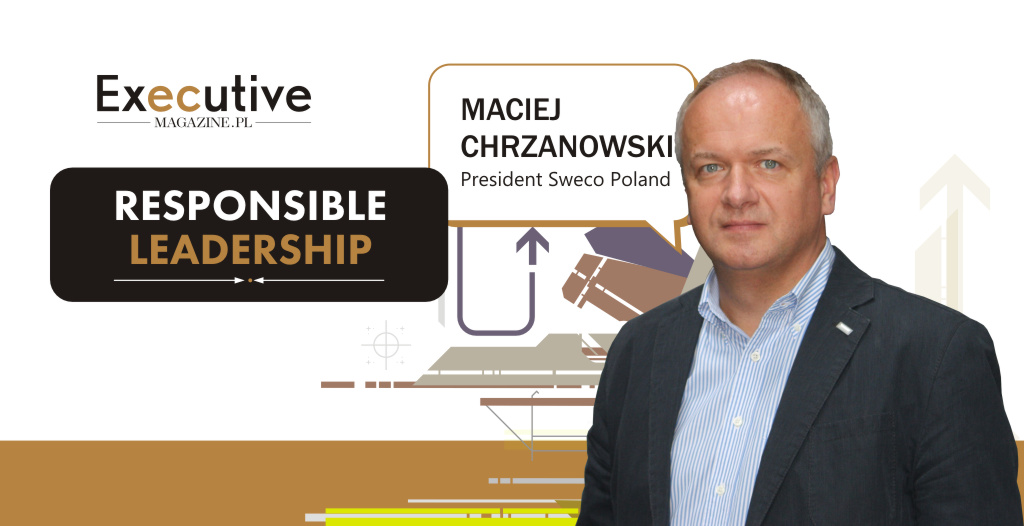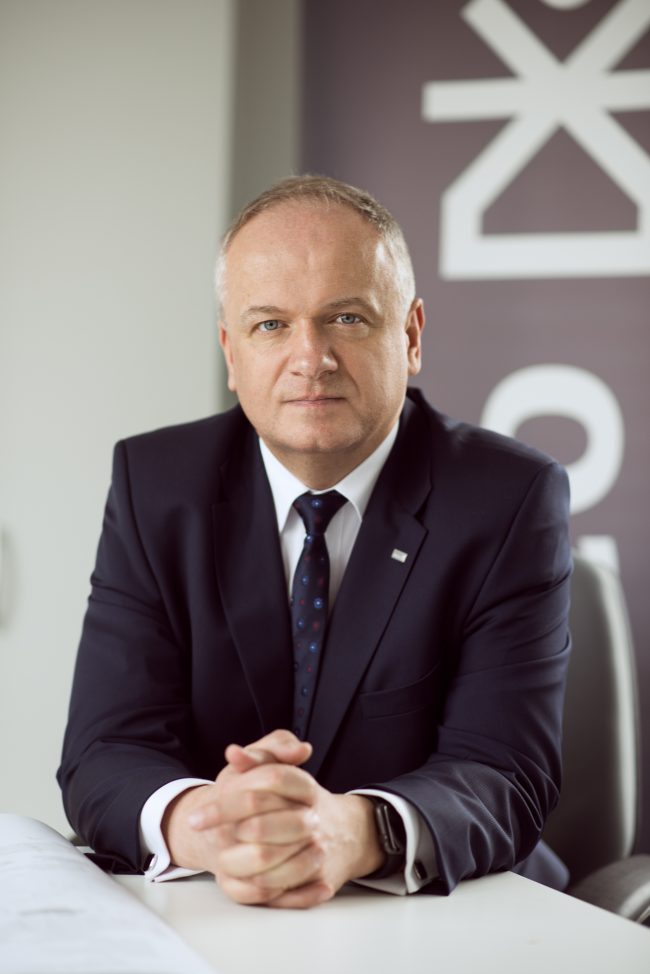

Maciej Chrzanowski
President of the Management Board of Sweco Poland
Nowadays, more and more often company managers put emphasis on the fact that their organization fits into a broader social context and undertakes initiatives related to corporate social responsibility. What does responsible leadership mean to you?
We can put the purpose of Sweco’s existence in 3 words: “Transforming society together”. Flexible adaptation to change and progress is part of all the projects we carry out in close cooperation with our clients, so that they serve people and the Earth. We have the opportunity to do this because we provide our services comprehensively – we are present at every stage of an investment, from consultancy through to design and supervision in the diverse markets of roads, water, environmental protection, energy, rail, and volume construction. We benefit from a solid resource base of more than 20,000 engineers, architects and other specialists working across the Group, including more than 500 in Poland.
What does responsible leadership mean? It is a broad concept and can be implemented on many levels. For me, it is first and foremost a way of making decisions and directing actions that take into account not only the financial interests of the company, but also social and environmental well-being. It is being aware of the impact of these actions on stakeholders, and making decisions that take into account the long-term benefits for both the organisation and society.
More and more investors and financial institutions choose as their partners those organizations that operate in accordance with ESG recommendations. Do you think that is right? How does the company you manage go beyond the so-called business as usual? What is it doing for the climate, local communities, diversity or what would you like to implement in the near future?
Operating a company on the basis of ESG-related recommendations is an approach that is increasingly gaining importance and acceptance among organisations and investors. In my view, it is a valid approach that can benefit both the organisation and society as a whole. Companies that focus on sustainability, social responsibility and good governance are more likely to succeed in the long term and build lasting relationships with their stakeholders. Furthermore, more and more investors, clients and employees prefer organisations that take responsible action in this area.
We are also aware that the construction sector is responsible for nearly 38% of greenhouse gas emissions. We are committed to reducing our carbon footprint and supporting planet-friendly measures, both in our clients’ projects and in our internal operations. The Sweco Group’s goal is to achieve climate neutrality by 2040, 10 years earlier than the EU’s target.
In our daily work, we are guided by the 17 UN Global Sustainable Development Goals, of which we have identified the 5 most critical, most important to our business, which we can influence in the projects we carry out. These are: Clean Water and Sanitation; Clean and Accessible Energy; Innovation, Industry, Infrastructure; Sustainable Cities and Communities as well as Climate Action.
Every company creates its corporate culture that embodies the values that customers see externally. Do customers prefer to choose this particular company because it does something good with which the customer identifies or is it mainly price-driven purchasing decisions? What is your opinion, what trends have you observed, is something changing in this area?
Gone are the days when an offer was decided solely on price. Sweco has always been committed to high standards of cooperation with its customers. We carry out projects together with them, not just for them. We focus on transparency, accessibility and full cooperation. Proof that our actions are effective can be seen, for example, in this year’s award of the Infrastructure and Construction Diamond in the first established category of Technical Advisor of the Year, which is awarded to entities that stand out for the high quality of their services.
In the public procurement market, where we mainly operate, non-price evaluation criteria are increasingly important. Many contracting authorities want to work with companies that can demonstrate best practice in the areas of environmental protection, management transparency or CSR. However, it is important to bear in mind that this type of investment involves the disbursement of public funds according to strict rules, and that contracting authorities do not have complete freedom of choice.
Every company creates its corporate culture that embodies the values that customers see externally. Do customers prefer to choose this particular company because it does something good with which the customer identifies or is it mainly price-driven purchasing decisions? What is your opinion, what trends have you observed, is something changing in this area?
Of course, this is important both from an ethical perspective and for the long-term success of the company and its stable growth through building trust and reputation, better internal relations, and minimising risks. At Sweco we have a very strict ethics policy and precise guidelines on how we should act. We only get involved in projects or collaborations after we have verified that our partners, colleagues and clients act ethically. We strictly adhere to the law, as the projects we are involved in are often strategic for the functioning of companies, local governments and even the country as a whole.
The world needs wise and good leaders who want to have a positive impact on their environment. Was there a moment when you started to look for a deeper meaning in your work, an opportunity to do something good for your communities or country? What has been achieved?
It is difficult for me to pinpoint one particular moment or event. My feeling is that we are now at a watershed moment, one that will directly determine the fate of future generations. I am not just referring to climate change, although this is very important. I am also referring to changes in the area of urbanisation or digitalisation. We – managers, designers, architects, environmental experts – have a great responsibility. All the actions we take today will directly affect the lives of our children, grandchildren and entire communities.



Maciej Chrzanowski – President of the Management Board of Sweco Polska sp. z o.o. since 2008. Graduate of: Poznan University of Technology (M.Sc. in Environmental Engineering), Nottingham Trent University and UEP (MBA); Nyenrode Business University (Enterpreneurial Leadership Program).
He has over 30 years of experience gained in the positions of: Consultant, Consulting Group Head, Business Development Director, General Manager. His entire career to date has been in the engineering consultancy industry.
In 2018, he was awarded the Knight’s Cross of the Order of Polonia Restituta for his outstanding contribution to the protection of the environment in Poland and his activities in the development of international cooperation in the field of environmental engineering.
Previously awarded the badge of honour “For Merits to Environmental Protection and Water Management” by the Minister of the Environment and the Gold badge of honour of PZITS (Polish Association of Sanitary Engineers and Technicians) by the Board of the Polish Association of Sanitary Engineers and Technicians.
Last Updated on May 30, 2023 by Janusz Gil